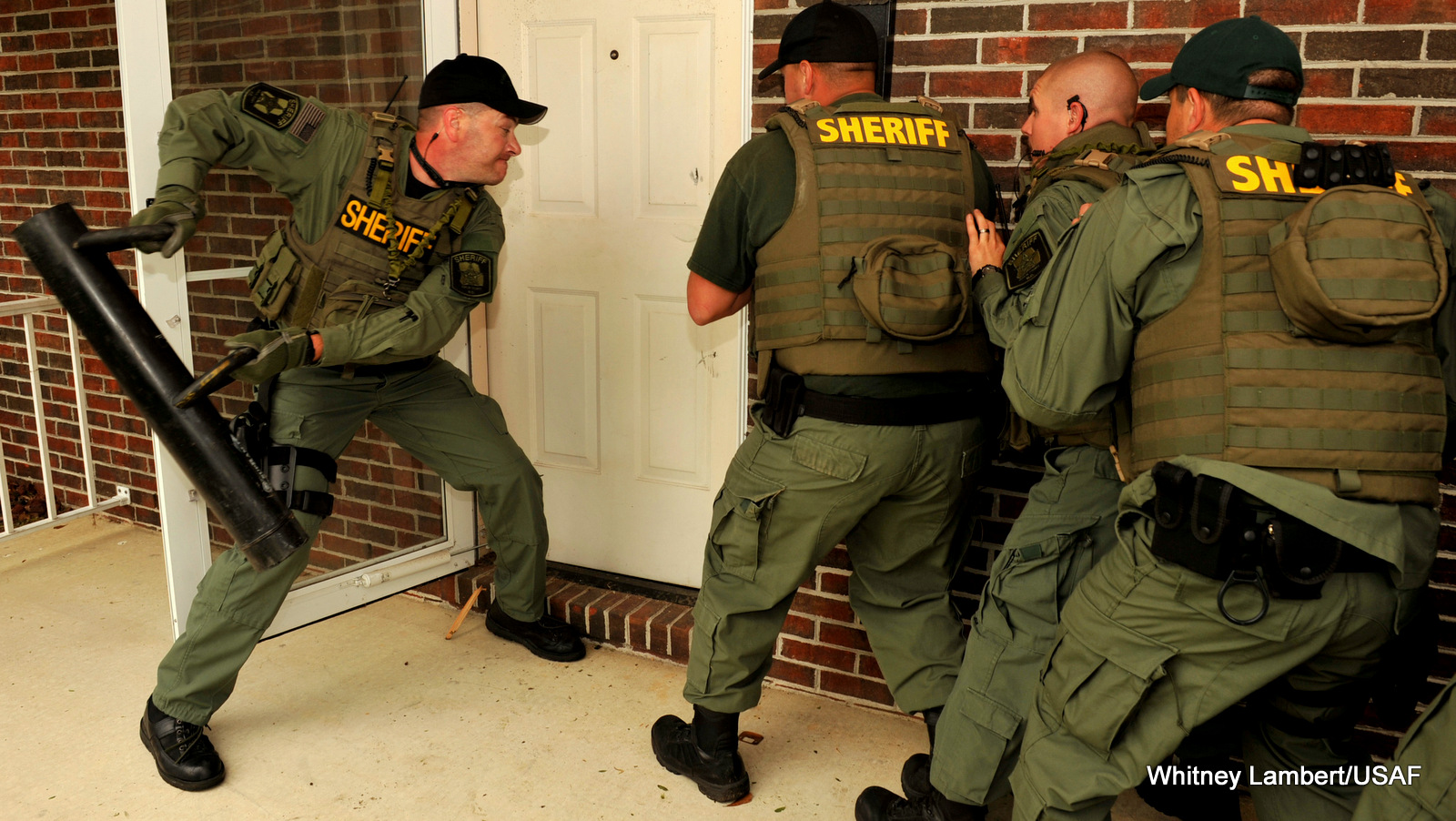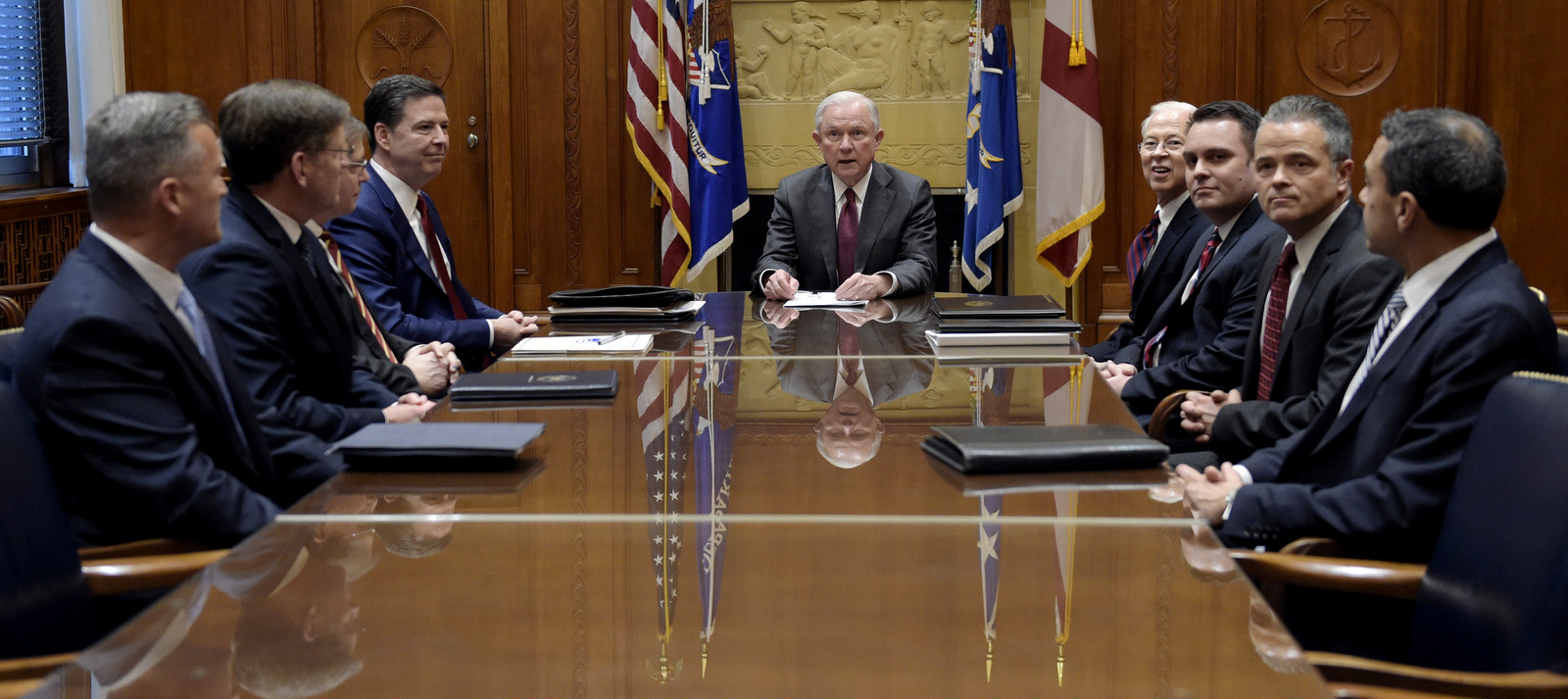WASHINGTON – U.S. Attorney General Jeff Sessions addressed a meeting of the National Sheriff’s Association on February 12 in Washington. As the nation’s chief law enforcer, Sessions was “among friends” and such an appearance should have been uneventful. What could possibly go wrong? Well … it appears that the Attorney General may have improvised a bit in his speech, straying away from the prepared remarks he was supposed to have given.
Sessions praised the 20,000 members present, assuring them they had the support of both himself and the man at the top, President Donald Trump. Driving that point home, Sessions said, “The office of sheriff is a critical part of the Anglo-American heritage of law enforcement. We must never erode this historic office.”
Now, from a historical standpoint, Sessions is correct. As the National Sheriff’s Association states on its website:
In England, the sheriff came into existence around the 9th century. This makes the sheriff the oldest continuing, non-military law enforcement entity in history … The concept of sheriff, because of the vast British Empire, was exported to places such as Canada, Australia, India, and, of course, the American Colonies.”
And yet, there is serious doubt as to whether Sessions’ brief history lesson was simply benign and innocent. To many, it sounded like yet another dog whistle to white supremacy.
Sheriffs picked up where slave patrols left off

A Duplin County Sheriff’s Office special response team prepares to shatter a door, and presumably it’s owners 4th Amendment rights, during a training exercise.
Many writers have opined that the cousins of the sheriffs here in the U.S., the police, have their origins rooted in slavery. As Time.com’s Olivia Waxman noted last year, citing the work of Eastern Kentucky University Professor Gary Potter, while the protection of shipping interests gave rise to the police in the Northeast, in the South the slave patrols, tasked with the capture of runaways and preventing rebellion, were law enforcement’s genesis.
Colin Taylor, writing for Washington Press, makes it plain why there would be present-day concerns about such a remark coming from the attorney general:
Anglo-American” obviously is code for ‘white’ – and, when taken in context of the historical role that white-dominated police forces have played in repressing black activism, murdering black Americans on a weekly basis, and crippling black communities by funneling huge numbers of people into the carceral state, it’s very clear what Sessions is saying: American police agencies are agents of white supremacy and they need to keep it that way.
Coming from anyone else, the remarks [to the sheriffs] would have raised eyebrows – but coming from a man who was literally kept off the judge’s bench for being too racist, serving an administration staffed with unrepentant ideological bigots and ‘white nationalists,’ there is no mistaking what this message really says.”
For Sessions, political and personal

Jeff Sessions holds a meeting with the heads of federal law enforcement components at the Department of Justice in Washington, Feb. 9, 2017. (AP/Susan Walsh)
Sessions ended his remarks to the sheriffs by saying, “We have your backs, you have our thanks.” Whereas someone else may have been just speaking words, Sessions was speaking policy.
The Department of Justice under Sessions has begun its own reversal of Obama-era work, saying it will not aggressively pursue police civil rights complaints against Blacks and other marginalized groups. That determination was made the second month Sessions had been on the job. Another revealing determination Sessions made around that same time was that it was a waste of time to read his department’s own in-house reports on problem police departments.
Read more by Thandisizwe Chimurenga
- Cops Rebranded as “School Resource Officers” Can Injure and Criminalize Schoolkids
- In NYC When Cops Backed Off, Crime Did Too
- In the US it’s “Objectively Reasonable” for Cops to Kill Arrestees with Hands Up
- Holding Top Cops Accountable: When the Brass Lead by Bad Example
It’s all too clear where Sessions and the Trump administration come down on matters of racial justice, all too clear that they more than have the sheriffs’ backs. But for Sessions in particular, the cause appears to be personal, almost genealogical. His family tree (he is Jefferson Beauregard Sessions III) has its roots in the antebellum South and his worldview has been shaped by a white-supremacist culture that only grew more virulent with the South’s defeat in the Civil War. Sessions’ history is riddled with problems — his address to the sheriffs is not a new turn, it’s just the latest expression of the bigotry and racism in which the attorney general is steeped.
Here’s Jeff Sessions talking about “the Anglo-American heritage of law enforcement” pic.twitter.com/Z7r0lOvBcI via @misstessowen
— Keegan Hamilton (@keegan_hamilton) February 12, 2018
OUTTAKES

Republican U.S. Senator-elect Jeff Sessions as he claims victory over his Democratic challenger in Mobile, Ala., Nov. 5, 1996. (AP/John David Mercer)
Jefferson Beauregard Sessions, III. His name should’ve told us everything we need to know. Sessions was named after his father and had no choice in the matter. Likewise, Jefferson Beauregard, Jr. was named for his father. And, like his subsequent progeny, the Sr. and first Jefferson Beauregard also did not have a say in his name, but that’s not important. What is important is the Sr. and first Jeff Sessions was born on April 13, 1861, the day after Confederate General Pierre Gustave Toutant-Beauregard opened fire on Fort Sumter in South Carolina. The attack was the opening salvo of the war of secession from the United States of several slave-holding southern states; South Carolina had left the union that preceding December. Those states that seceded declared themselves the Confederate States of America, and their president was Jefferson Davis. It’s a safe bet that the Sr. and first Jeff Sessions’ father, Jonathan, was as aware as any fellow Alabaman of the mood in the southern region prior to those shots being fired off the coast of South Carolina. It’s also a pretty safe bet to guesstimate where Jonathan stood when he gave his son the names of two Confederate officials.
In the South … the economics that drove the creation of police forces were centered not on the protection of shipping interests [as they were in the northeastern U.S.] but on the preservation of the slavery system. Some of the primary policing institutions there were the slave patrols tasked with chasing down runaways and preventing slave revolts; the first formal slave patrol had been created in the Carolina colonies in 1704.
During the Civil War, the military became the primary form of law enforcement in the South, but during Reconstruction, many local sheriffs functioned in a way analogous to the earlier slave patrols, enforcing segregation and the disenfranchisement of freed slaves.”
Top Photo | Attorney General Jeff Sessions bows his head during a prayer session prior to addressing the National Sheriffs’ Association Winter Conference in Washington, Feb. 12, 2018. (AP/Cliff Owen)
Thandisizwe Chimurenga is an award-winning, freelance journalist based in Los Angeles, California. She is a staff writer for MintPress News, Daily Kos and co-hosts a weekly, morning drive-time public affairs/news show on the Pacifica Radio network. She is the author of No Doubt: The Murder(s) of Oscar Grant and Reparations … Not Yet: A Case for Reparations and Why We Must Wait; she is also a contributor to several social justice anthologies.
The post Jeff Sessions’ Dog Whistle to White Supremacy: Sheriffs Guard Our “Anglo-American Heritage” appeared first on MintPress News.
